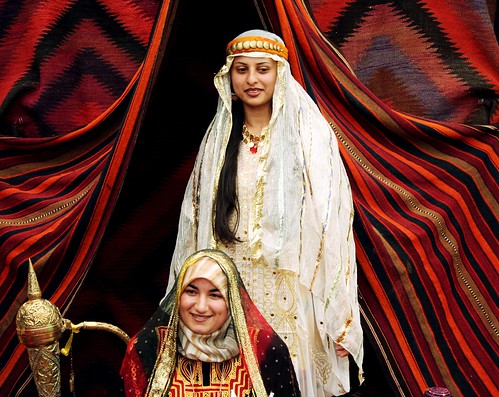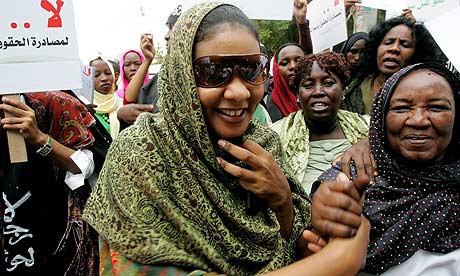Saudi women fight for autonomy
-
- guardian.co.uk, Saturday 5 September 2009 13.00 BST
- Article history
When living in Saudi Arabia, every time I wanted to travel outside the kingdom I had to produce a piece of paper from my male guardian authorising my movements in order to be granted an exit visa. This process became more difficult when my father passed away, after which my sisters and I were left scrambling for the closest male relative to sanction our travel.
Several of my Saudi friends had to forgo completing their studies abroad when their families refused permission. The lucky few managed to get a younger brother to accompany them for the entire duration of their studies.
The wali, or guardian, is the practical underwriter of a woman's existence in Saudi Arabia. These mahrams (male relatives whom it is haram – forbidden – to wed) sit in a pyramid of patronage with the father and husband at the pinnacle, descending through uncles (paternal uncles higher up the scale, naturally) and bottoming out with brothers.
The power and significance of the wali in each woman's life differs according to the family and relationship. While some are relatively relaxed about their duties and their approval for travel, etc, is merely a formality, others abuse their positions and can totally dictate the course of a woman's life.
Recently, according to Sabria Jawhar in an article for the Huffington Post, "Pressure from outside Saudi Arabia has been building to abolish guardianship laws, and a number of women who fashion themselves as activists have led the charge."
Jawhar is upset with a female Saudi activist named Wajeha al-Huwaider whom she accuses of "showboating" and "unseemly" behaviour. Huwaider's "showboating" involved a public protest in which she was driven to the Saudi border with Bahrain and then got turned back due to her inability to produce her guardian's written permission to travel.
To counter this liberal activism, a conservative campaign – under the slogan "My Guardian Knows the Best for Me" – was recently launched to oppose dismantling of the guardianship system. The movement, launched by Rawdah el-Yousif (although ironically, she is in dispute with a man over who can claim the credit for the campaign) is a vehicle for, in Rawdah's words, expressing "dismay at the efforts of some who have liberal demands that do not comply with Islamic law or with the kingdom's traditions and customs".
In an overwhelmingly patriarchal and segregated society, where there is little accommodation of women in official circles, it is not surprising that men should be able to conduct affairs on behalf of their female relatives. For a female without a mahram, carrying out even the most basic transactions in places staffed entirely by ogling, dismissive, men is excruciating. But to legally hand the reins entirely to men signs over the fate of half the population to those who are potentially capricious, overbearing and misogynistic in a deeply traditional society.
The additional legal layer, in most cases, is entirely superfluous as most families will act according to custom, tradition and specific family values. The majority will self-regulate. As Sabria Jawhar says, "Many families treat their wives, daughters and sisters with great respect and don't follow their every move. Permission to travel or to conduct business abroad is often granted carte blanche with a signed piece of paper from a mahram. Many women travel freely with this document and consult little with the men in their families about their movements."
But what this legal dimension does in other cases is ensure that despotic guardians have an iron grip, leaving little leeway for their women to flee, travel or challenge their guardianship. Abolition of the guardianship system (in itself an improbable event) is unlikely to result in hordes of women running amok in the streets and airports of Riyadh – so what is it that prompts other women to entreat the authorities not to do away with a way of life that is not immediately under threat?
I do not believe it is anything as clichéd as Stockholm syndrome or even a sincere commitment to what they believe are religious values. Even under subjugation, women have power, mostly over other women, and that power is drawn from their hard-earned position in the established hierarchy.
Those that have excelled at compliance have achieved some status and can then look down on the less honourable and rebellious. An assault on this system destroys an entire arsenal of survival skills and lifetime of work. Like the chronically redundant, they would have to retrain and re-enter the job market at junior level with all the other upstarts. In fact, by allying themselves to the male guardians, women are then delegated power that they can in turn wield themselves. They have a vested interest in the status quo and in maintaining their positions as the matrons of propriety.
It is true that public demonstrations of opposition to the wali system may alienate popular opinion and rally support only from abroad, but launching such a counter campaign reeks of distasteful one-upmanship of its own. The agenda is to discredit any women who call for more freedom in Saudi as agents of external liberal forces before any of their efforts or values become remotely mainstream.
Nobody is stopping women from deferring to their guardians' authority in their private lives, but insisting that this authority applies across the board shows a shocking disregard for other women not privileged enough to have guardians who "know what's best for them".
http://www.guardian.co.uk/commentisfree/2009/sep/05/saudi-arabia-womens-rights
Image Shock


Capt. Hanadi Zakaria Al-Hindi: The first Saudi woman to got a pilot's license in Jordan. She has a ten-year contract with Prince Al-Waleed bin Talat's Kingdom Holding Company as a chief captain of his private jet, the Kingdom. Reports highlighted the irony that a Saudi woman is allowed to pilot an aeroplane but may not drive a car.
Pursuing happiness behind the veil

OTHER HALF: Saudi women hang out at a mall in Riyadh. Under the strict Saudi interpretation of Islam, women must be fully covered in public and are not allowed to drive or vote. Wives need their husbands permission to leave the country. (EPA)

Sex-segregated sidewalks

saudi women in national dress
__._,_.___






